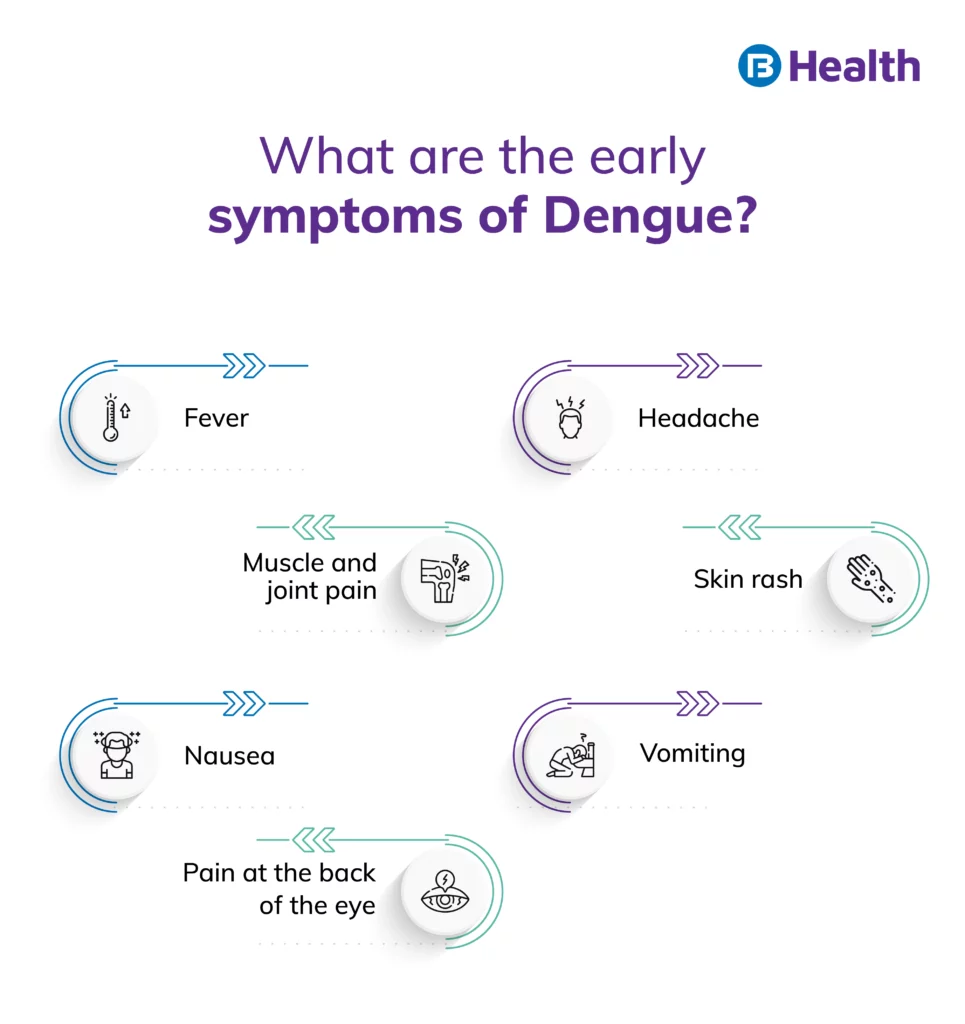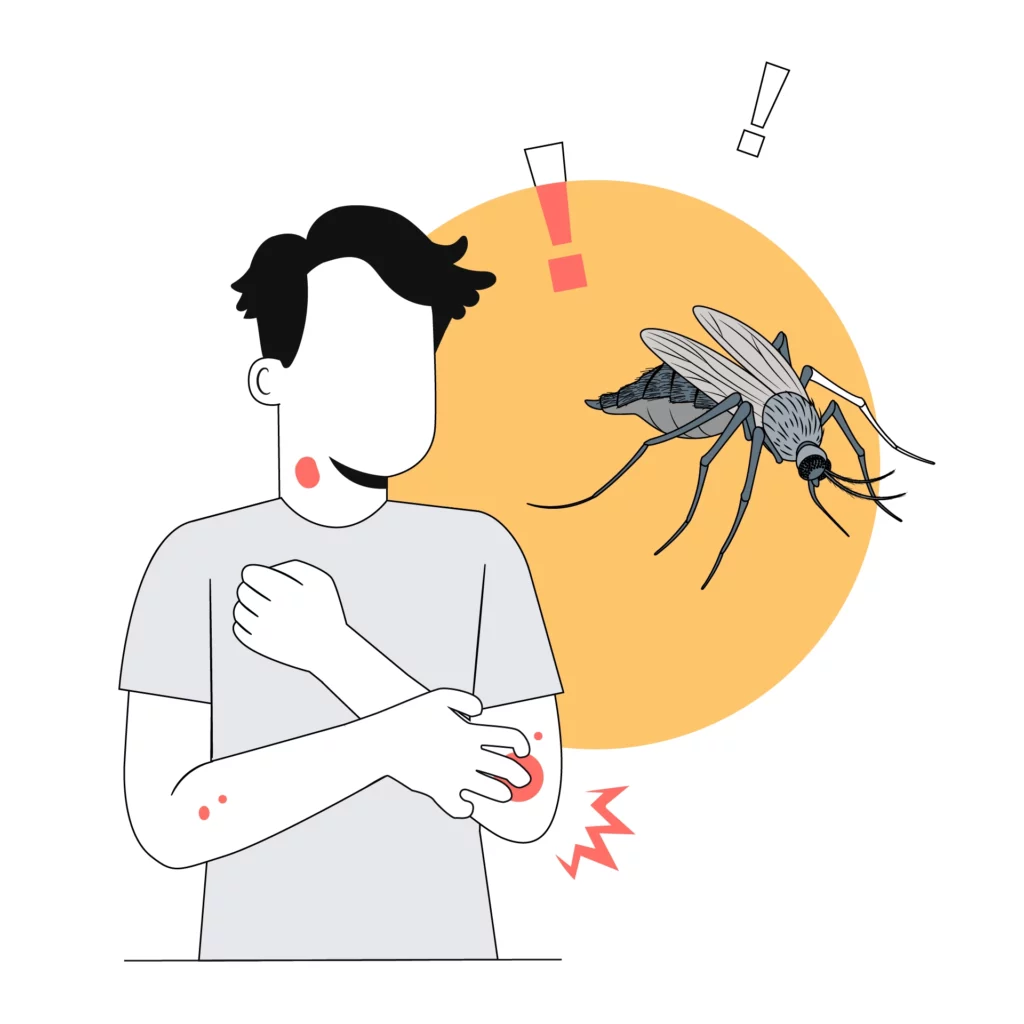General Health | 6 min read
Common Dengue Fever Symptoms: Learn to Stop Turning Into Severe Dengue
Medically reviewed by
Table of Content
Synopsis
Dengue is a viral disease transmitted by infected mosquitoes. Fever, headaches, severe abdominal pain, bleeding, and even organ failure are some of the symptoms caused by dengue. Early recognition of dengue symptoms is crucial for prompt treatment and better recovery.
Key Takeaways
- Dengue is caused by one of four closely related viruses known as Dengue virus (DENV 1, 2, 3, 4)
- Dengue fever is not contagious, which means it can't be spread from person to person directly
- Aedes mosquitoes are responsible for spreading dengue among the population
Dengue outbreaks usually occur during the rainy season, when mosquito breeding is most active. So, it's crucial to stay more cautious of dengue symptoms during monsoons.
Around the world, an estimated 390 million dengue infections occur each year, resulting in up to 36,000 deaths. [1] It is essential to raise awareness of dengue symptoms so that individuals can seek prompt medical attention and reduce the risk of severe complications. Early detection of severe dengue and access to proper medical care decreases critical dengue fatality rates to less than 1%. [2].
Symptoms of Mild Dengue
It usually appear within 4 to 7 days after an infected mosquito bites a person. It is important to note that only some people with dengue will experience all of these symptoms.
Fever
One of the major symptoms of dengue is a high fever, often lasting for several days. The fever can range from 101 to 105 degrees Fahrenheit and may be accompanied by chills and sweating.
Severe headache
Dengue fever can cause a severe headache, usually located behind the eyes. This headache can be intense and throbbing and may make it difficult to concentrate or perform daily activities.
Muscle and joint pain
Dengue can cause severe muscle and joint pain, particularly in the back, arms, and legs. This pain can be so intense that it is often called "break-bone fever."

Nausea, vomiting, and diarrhoea
Many people experience gastrointestinal dengue symptoms such as vomiting, nausea, and diarrhoea. These symptoms can lead to dehydration, a potential dengue complication.
Skin rash
A red rash is regarded as a common symptom of dengue fever and typically starts on the trunk of the body and spreads to the limbs, often accompanied by itching. Other viral illnesses can also cause similar rashes, so it is important to visit a doctor.
Fatigue and weakness
Dengue fever can cause extreme fatigue and weakness, persisting for several weeks even after the fever has subsided. It can take some time for a person to recover from dengue fever fully.
Severe Dengue Symptoms
The main severe dengue symptoms are Burst bleeding blood vessels and a low platelet count. Platelets are the cells that form clots. A low count can result in shock, internal haemorrhage, organ failure, and even death.
- Severe abdominal pain
- Persistent vomiting
- Bleeding gums or nosebleeds
- Bleeding beneath the skin that appears as red spots
- Difficulty breathing
- Fatigue and restlessness
- Rapid heartbeat
- High fever of 105 degrees Fahrenheit or 41 degrees Celsius
- Irritability or agitation
While mild dengue symptoms can usually be managed with rest and hydration, severe forms of the disease can be life-threatening. It is important to monitor signs closely and seek medical attention immediately if they don't go away or worsen.
Warning Signs of Dengue Fever
The signs and symptoms of dengue fever can vary individually and depends on the severity of the illness. Some people with dengue fever experience only mild symptoms. While in some cases, dengue fever can lead to more severe complications, such as dengue shock syndrome and dengue hemorrhagic fever. These symptoms can be life-threatening.
Early Symptoms of Dengue
Only about one in four people infected with dengue get sick and show early symptoms of dengue fever [3]. And when they do, these symptoms are often mistaken for the flu or other viral infections due to their similarity with other viral fever symptoms. The early signs of dengue include:- Fever
- Headache
- Muscle and joint pains
- Skin rash
- Nausea
- Vomiting
- Pain at the back of the eye

Dengue Fever Symptoms in Children
Dengue symptoms in children are almost similar to the dengue symptoms in adults(which have been discussed below). However, it may be more severe in some cases. It is vital to monitor children for signs of dengue, such as dehydration and to seek medical attention if any symptoms are severe. Dengue can progress rapidly in children, so early recognition and treatment are essential.
Dengue Fever Symptoms in Adult
The progression of dengue fever symptoms in adults typically follows a three-phase pattern:
Febrile phase
This phase usually lasts for 2-7 days and is characterized by sudden onset of high fever, which can be accompanied by severe headache, joint pain, muscle pain, and pain behind the eyes. Other signs may include dengue symptoms, rash, swollen lymph nodes, and fatigue.
Critical phase
This phase usually occurs after the fever subsides and lasts 24-48 hours. There is an increased risk of developing severe complications such as plasma leakage, bleeding, and organ failure during this time. Symptoms during this phase may include persistent vomiting, rapid breathing, abdominal pain, and restlessness.
Recovery phase
The recovery phase can last for several days to weeks and is characterized by a gradual improvement in symptoms. The patient may experience fatigue, mild fever, and skin rash during this phase. In some cases, patients may develop complications such as joint pain, muscle weakness, and depression.
Not all patients will experience all three phases of dengue symptoms, and the severity and progression of symptoms can vary widely.
Additional Read: Dengue Platelet Count TestDiagnosis
The first step in diagnosing dengue fever is to get a physical examination. The doctor will check for dengue signs and symptoms, such as a rash or enlarged lymph nodes.
However, blood tests can accurately diagnose dengue. A significant drop in platelet count is a concerning symptom that should not be overlooked. Typically, the platelet count per microliter of blood ranges from 1.5 lacks to 4.5 lacks. This count may drop to 20,000 or lower in people suffering from dengue. The count returns to normal once the person recovers from dengue.
Treatment
There isn't any specific antiviral treatment for dengue. Treatment mainly focuses on relieving the symptoms and preventing severe complications.
Here are some treatments for dengue fever:
Rest and Hydration:
Getting plenty of rest and staying well-hydrated are essential for managing dengue fever. Drinking lots of fluids, such as water, juice, and electrolyte solutions can help prevent dehydration,
Medications:
Over-the-counter pain relievers, such as acetaminophen, can help to reduce fever and relieve pain. However, aspirin and nonsteroidal anti-inflammatory drugs (NSAIDs), such as ibuprofen, should be avoided because they can increase the risk of bleeding. Always consult a general physician before taking any medications.
Hospitalization:
Hospitalization may be necessary in severe cases of dengue fever. Patients with severe dengue may need intravenous fluids and medications to maintain blood pressure and prevent shock. Blood transfusions may also be necessary to replace lost blood.
Monitoring:
Patients with dengue symptoms should be closely monitored for developing dengue hemorrhagic fever or dengue shock syndrome
Prevention Of Dengue
Reducing mosquito breeding sites and preventing mosquito bites can help control dengue. This can be done by wearing long-sleeved clothing, using mosquito repellent, and eliminating standing water in and around homes.
It's essential to be aware of warning dengue symptoms to take action early. While most of the dengue symptoms can be treated with rest and fluids, severe forms will require hospitalization. You can get a doctor consultation at Bajaj Finserv Health, which allows you to talk to a doctor from your home.
Visit the Bajaj Finserv Health website to schedule a teleconsultation appointment with a qualified physician. The doctor will evaluate your symptoms and provide a personalized treatment plan to help you recover quickly and safely.
References
- https://www.worldmosquitoprogram.org/en/learn/mosquito-borne-diseases/dengue#:~:text=affected%20by%20dengue%3F-,More%20than%20half%20of%20the%20world's%20population%20is%20at%20risk,in%20up%20to%2036%2C000%20deaths.
- https://www.who.int/news-room/fact-sheets/detail/dengue-and-severe-dengue
- https://www.cdc.gov/dengue/symptoms/index.html
Disclaimer
Please note that this article is solely meant for informational purposes and Bajaj Finserv Health Limited (“BFHL”) does not shoulder any responsibility of the views/advice/information expressed/given by the writer/reviewer/originator. This article should not be considered as a substitute for any medical advice, diagnosis or treatment. Always consult with your trusted physician/qualified healthcare professional to evaluate your medical condition. The above article has been reviewed by a qualified doctor and BFHL is not responsible for any damages for any information or services provided by any third party.





